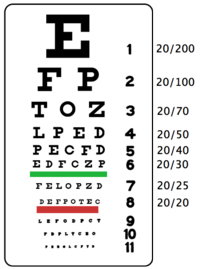Have you told a friend or family member that you have “Low Vision” only to have them ask “What is Low Vision?”
What does “low vision” really mean? If someone with a vision impairment has “low vision”, does that mean someone with 20/20 vision has “high vision”? Is “low vision” an eye condition or a result of an eye disease?
The term “low vision” is used to describe the vison of a person who has an eye disease or condition in which visual acuity is 20/70 or greater in the better-seeing eye and cannot be corrected or improved with regular eyeglasses. Visual acuity is referred to as a number that indicates the sharpness or clarity of vision. This means that on the chart pictured below, your best eye could read the third line down when standing 20 feet away and a person with unimpaired or 20/20 vision can see from 70 feet away. * Low Vision is not the same as legal blindness. Being legally blind usually means your visual acuity is 20/200 or greater in the better-seeing eye.

Low vision, also known as visual impairment, is a result of an eye disease or injury which is permanent and involves a significant loss of vision such as; age-related macular degeneration, glaucoma, cataracts, diabetic retinopathy, retinitis pigmentosa, Stargardts, and others. Almost half of the reported cases of visual impairments are caused by age-related macular degeneration.
The resulting visual impairment cannot be corrected with standard reading glasses and usually require a person to perform everyday functional tasks with the help of adaptive aids, magnifying lenses, or electronic magnifiers. This includes activities such as reading, writing, balancing a checkbook, cooking, grooming, etc.
When visiting your eye care professional, ask about a low vision examination or a referral to a low vision specialist. This examination will help determine what functional vision you have and what adaptive aids would be best to get the most out of your remaining vision. Other professionals that can help you harness your remaining vision and make it work for you are Occupational Therapists and Orientation & Mobility Specialists. Having a group of professionals focused on helping you use your remaining vision will support you in your endeavor to lead a fuller and more independent life.
Would you like to connect with a low vision specialist in your area? Or would you like to schedule a demonstration of low vision aids that can help you remain independent? Connect with us!
*The above chart is not to scale and is not intended to test your vision or that of a friend or relative. Please consult your eye care professional to accurately diagnose your vision acuity.
Additional Resource –
Low Vision FAQ’s – National Eye Institute
Feb 10, 2020


